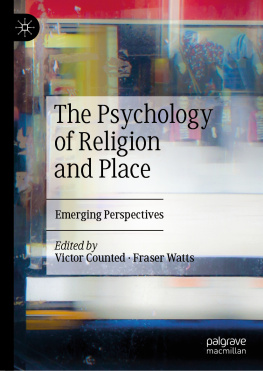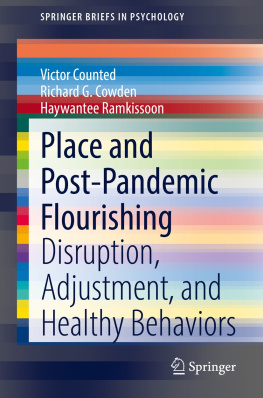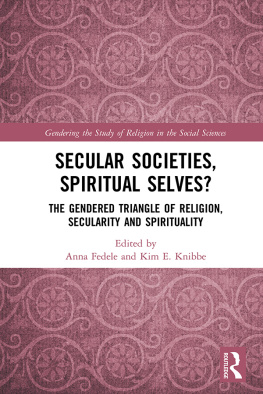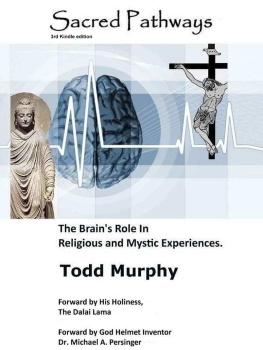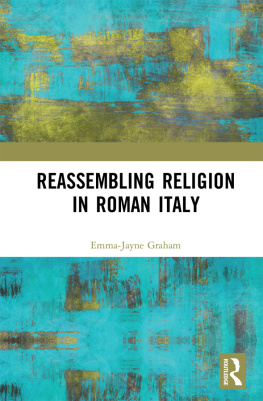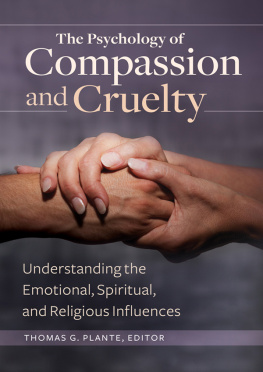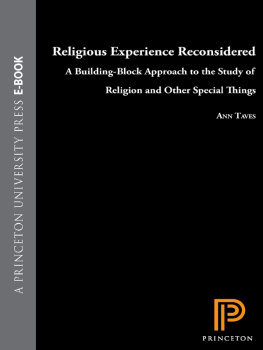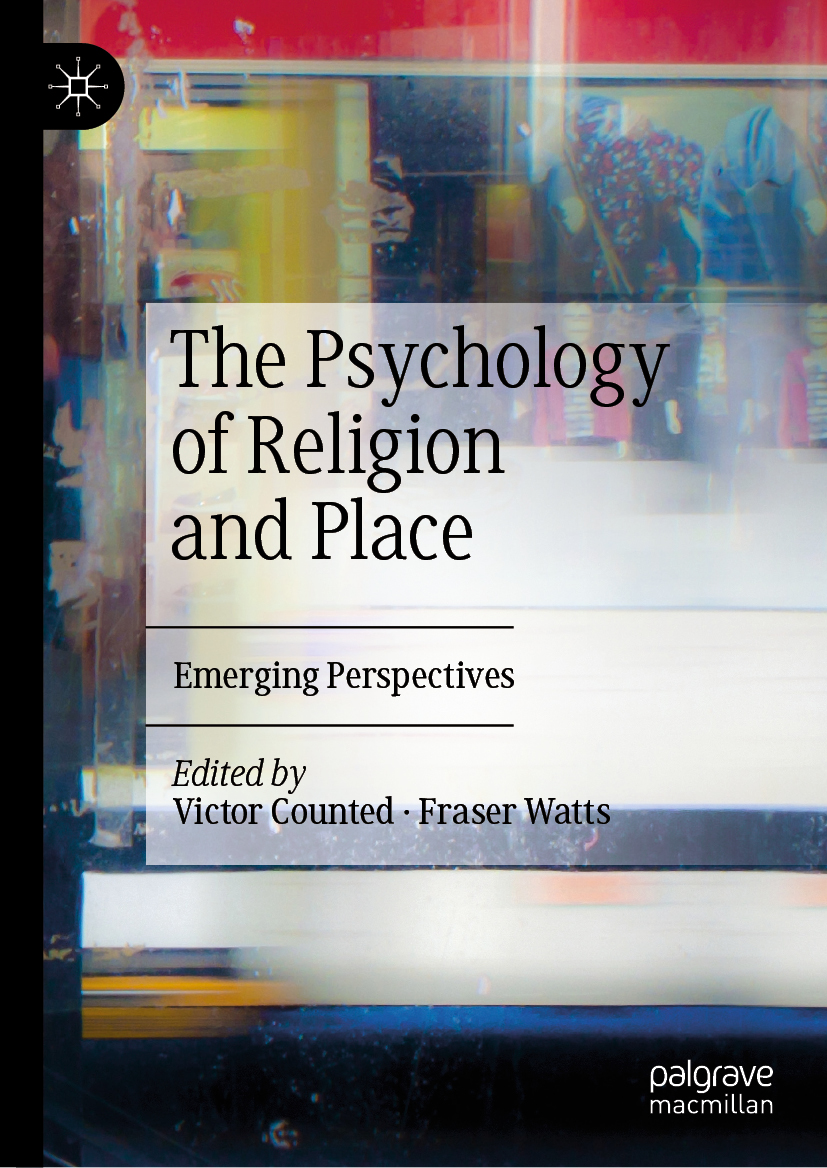Editors
Victor Counted and Fraser Watts
The Psychology of Religion and Place
Emerging Perspectives
Editors
Victor Counted
School of Social Sciences and Psychology, Western Sydney University, Sydney, NSW, Australia
Fraser Watts
School of Psychology, University of Lincoln, Lincoln, UK
ISBN 978-3-030-28847-1 e-ISBN 978-3-030-28848-8
https://doi.org/10.1007/978-3-030-28848-8
The Editor(s) (if applicable) and The Author(s), under exclusive license to Springer Nature Switzerland AG 2019
This work is subject to copyright. All rights are solely and exclusively licensed by the Publisher, whether the whole or part of the material is concerned, specifically the rights of translation, reprinting, reuse of illustrations, recitation, broadcasting, reproduction on microfilms or in any other physical way, and transmission or information storage and retrieval, electronic adaptation, computer software, or by similar or dissimilar methodology now known or hereafter developed.
The use of general descriptive names, registered names, trademarks, service marks, etc. in this publication does not imply, even in the absence of a specific statement, that such names are exempt from the relevant protective laws and regulations and therefore free for general use.
The publisher, the authors and the editors are safe to assume that the advice and information in this book are believed to be true and accurate at the date of publication. Neither the publisher nor the authors or the editors give a warranty, expressed or implied, with respect to the material contained herein or for any errors or omissions that may have been made. The publisher remains neutral with regard to jurisdictional claims in published maps and institutional affiliations.
Cover illustration: Alex Linch shutterstock.com
This Palgrave Macmillan imprint is published by the registered company Springer Nature Switzerland AG
The registered company address is: Gewerbestrasse 11, 6330 Cham, Switzerland
It is fitting that one of the first books to take up a serious psychological consideration of religion, spaces, and places should push against multiple intellectual boundaries. Particularly useful is the fact that the expert chapter authors do not all press in identical directions; instead, they explore multiple theoretical frontiers. Likewise, as opposed to advocating for a theoretically or practically narrow field of vision, the contributions highlighting potential applications open up a wide, interdisciplinary landscape of possibilities. This is precisely the type of book I value the most. Rather than telling readers how they ought to think, it provides theoretical tools for navigation and invites them to chart their own courses into these fresh territories.
Kevin L. Ladd, Former President of the Society for the Psychology of Religion and Spirituality (APA, Division 36); Board of Directors, International Association for the Psychology of Religion; Editor-in-Chief, Archive for the Psychology of Religion; Professor of Psychology, Indiana University South Bend, USA
This book successfully examines a fascinating area of growing interest and relevance yet hardly addressed from geographical and psychological perspectives: spirituality and place. The reader will find compelling ideas, clear arguments, state-of-the art scholarship, and a wide number of entries that explore and advance the embodied dimensions of religion.
Julio Bermudez, Director, Sacred Space and Cultural Studies Program, School of Architecture and Planning, The Catholic University of America, USA, and President, The Architecture, Culture, and Spirituality Forum
This is a pioneering and deeply interesting study of the psychological aspects of religion and place - for example exploring the fascination of the idea of holy places. I have long felt that attachment theory provides a powerful lens for the study of religion, and this book is a great demonstration of how attachment theory helps to illuminate the psychology of religion and place, while also offering other perspectives.
Kate Miriam Loewenthal, Professor Emeritus, Royal Holloway, University of London, UK; Professor of Abnormal Psychology, New York University in London, UK; Visiting Professor, Glyndwr University, Wales; Editor , Mental Health, Religion & Culture
Diverse and even controversial points of view are intelligently brought to bear in this volume on the important but long-neglected phenomenon of place as it figures into religious experience and practice.
David Wulff, Professor of Psychology, Emeritus, Wheaton College Norton, USA
Contents
Victor Counted and Fraser Watts
Part I Theoretical and Methodological Perspectives
Rupert Sheldrake
Victor Counted
Laura E. Captari , Joshua N. Hook , Jamie D. Aten , Edward B. Davis and Theresa Clement Tisdale
Fraser Watts
Marino Bonaiuto , Thomas Albers , Silvia Ariccio and Silvia Cataldi
Avril Maddrell
Nell Aubrey
Victor Counted
Joel Gruneau Brulin
Part II Empirical Applications and Practical Implications
Boadi Agyekum
Miriam Billig
David Seamon
Ken Estey
Victor Counted and Tanya Meade
Victor Counted and Fraser Watts
List of Figures
Fig. 2.1 Nested hierarchies or holarchies of morphic units. The smallest circles could be subatomic particles, in atoms, in molecules, in crystals; or cells, in tissues, in organs, in organisms
Fig. 3.1 The circle of place spirituality ( Victor Counted)
Fig. 7.1 Material, embodied psychological and virtual spatialities: a conceptual framework for understanding dynamic spatial relations (After Maddrell [2016, p. 181])
Notes on Contributors
Boadi Agyekum, Ph.D.
is a social geographer, specializing in health research addressing: immigration, migration, sense of place, sense of community belonging, religion, quality of life and therapeutic landscapes. He currently is a Lecturer at the School of Continuing and Distance Education, University of Ghana and doubles as the Head of University of Ghana Learning Centre at Tema. He received his Ph.D. in Health Geography from McMaster University in 2016 and worked as a researcher at Artists to Artists Foundation between 2016 and 2017 in Toronto, Canada before returning to the University of Ghana in 2018.
Thomas Albers
is a Ph.D. candidate at the Sapienza University of Rome in social and environmental psychology. He studies the emotion of Pride of Place and its consequences on an individual and societal level. Thomas also works for the Anatta Foundation in The Netherlands where he is the coordinator of an EU funded project on the promotion of Pride of Place in secondary education. He is passionate about environmental and positive psychology and seeks to combine both research fields in his studies and work. For the Anatta Foundation he delivers trainings for young people to increase peoplenature connections.
Silvia Ariccio, Ph.D.

